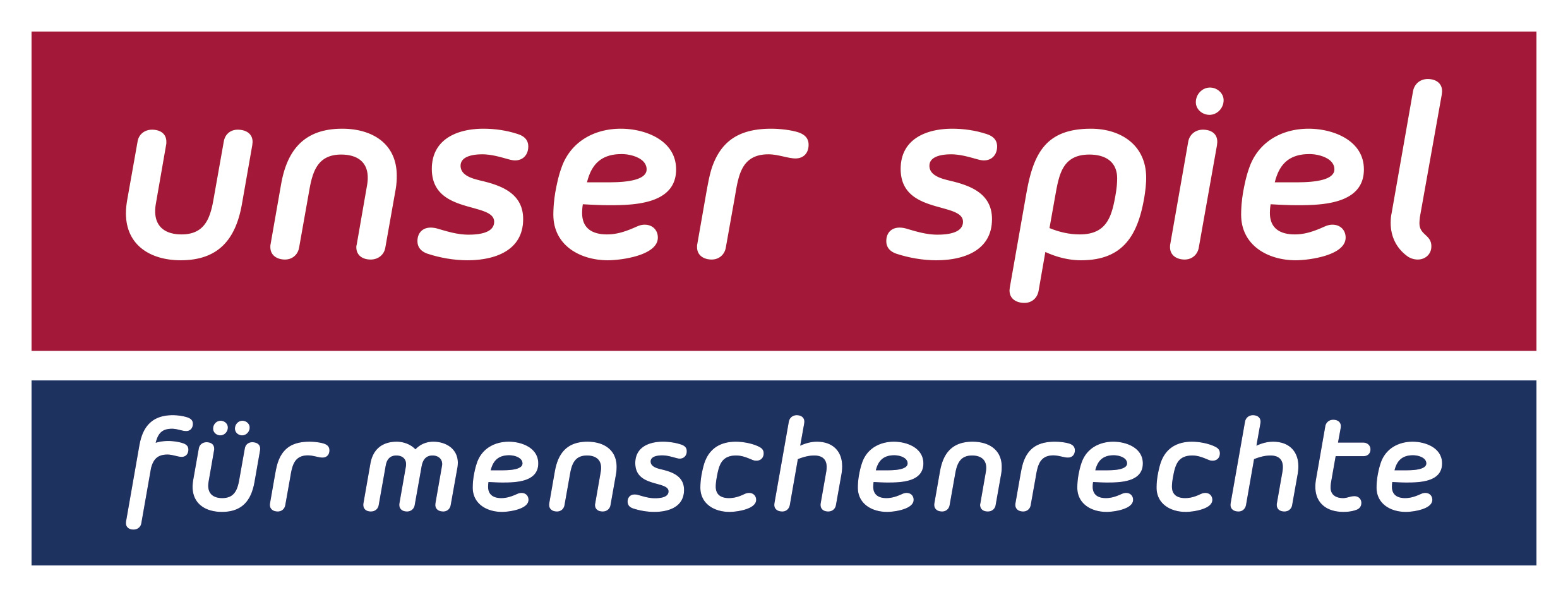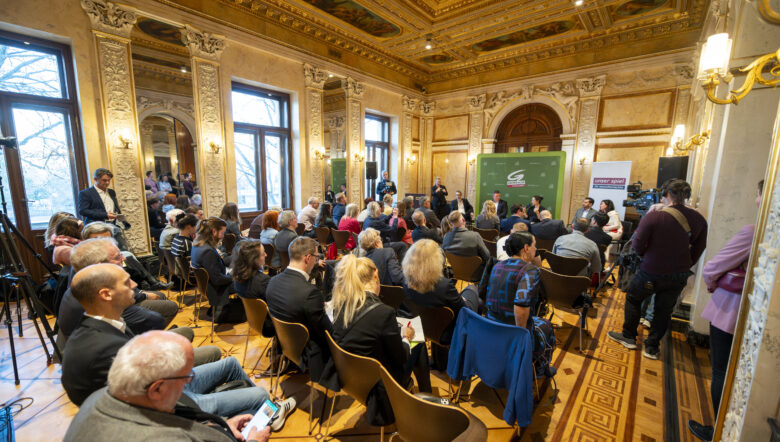Report on the dialogue forum “Learning from Qatar 2022” in the Austrian Parliament
Sixteen months after the final whistle of one of the most controversial football World Cups in the history of modern sport, a dialogue forum was held at Palais Epstein at the invitation of the fairplay initiative and the Green Club in Parliament on the topic of Learning from Qatar 2022: The protection of human rights at future international sporting events.
The event was intended to bring the 2022 FIFA Men’s World Cup back to mind and provide the impetus to bring the topic of sport and human rights more into the focus of the Austrian parliament and Austrian sport. In addition, parliamentarians and representatives of sports and human rights organizations and (sports) media should learn more about human rights at major sporting events and the related activities in Austria and at international level.
The event was moderated by Martin Kainz (human rights expert, former UNOCT) and took place with interpretation in Austrian sign language.
Vice-Chancellor and Sports Minister Werner Kogler opened the event and welcomed the almost 50 participants. He recalled the controversial awarding of the FIFA World Cup to Qatar in 2010 and the various human rights violations on site, and also referred to future problematic major sporting events such as the FIFA World Cup 2034 in Saudi Arabia. As an introduction to the two panels, he already mentioned leading activities in Austria in the opening speech, such as the working group Sport & Human Rights, which was founded in 2015 and is coordinated by the fairplay initiative, or the handbook “International Sporting Events & Human Rights“, which was created by the fairplay initiative in 2021.
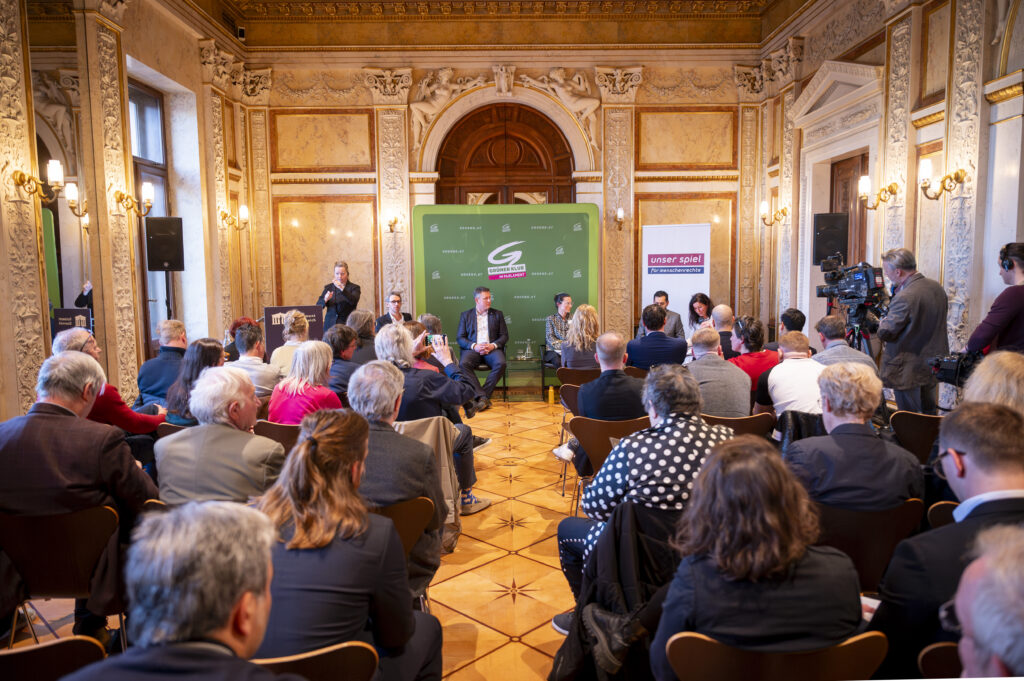
First panel with Martin Poiger, Hanna Stepanik and Mustafa Qadri
Panel discussion – Lessons and learning from Qatar 2022
The first panel discussion began with the current human rights situation in Qatar and the question of potential improvements, before concluding with the role of various stakeholders and the example of the Sport & Human Rights Working Group.
Mustafa Qadri, Director of the international human rights organization Equidem, and his team of migrant investigators were the first to systematically investigate the working conditions on World Cup construction sites in Qatar in 2016. He reported on the difficulties and dangers of this research and investigation work, but also highlighted the unworthy living conditions of many workers: “We were actually arrested by the police, we spoke to around 300 workers – construction workers who were literally starving to death because their employer was no longer paying them”. Due to international pressure before and during the World Cup, agreements and labor market reforms were finally reached. These included a minimum wage and the option to leave the country or change employer.
In 2022, Equidem conducted another investigation and uncovered large-scale cover-ups of forced labor. “So even if there are formal changes to the law, which undoubtedly benefit some workers, there can be no real reform process if you implement reforms in a country where it is basically a crime to protest,” Qadri summarized. He also referred to the responsibility of the world football association FIFA. “The reality is that FIFA is all about money and market positioning. This has nothing to do with the values that should be at the heart of sport. The values of football are not FIFA’s ideals,” said Qadri.
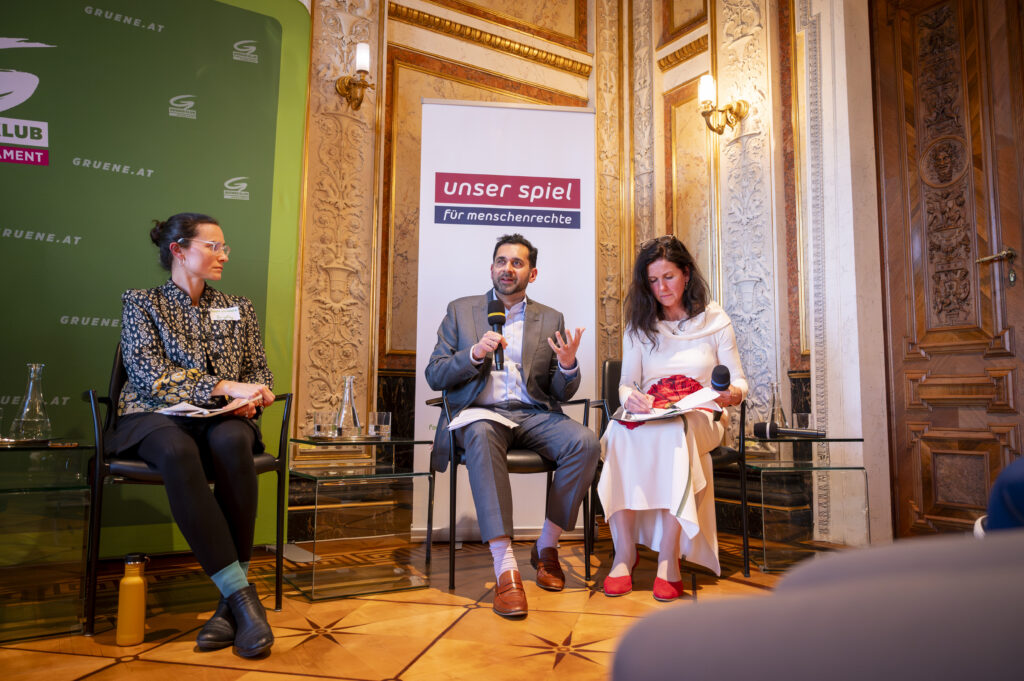
Mustafa Qadri, Director of the international human rights organization Equidem
Hanna Stepanik (fairplay-VIDC) added to the presentation on labor rights with insights into women’s and LGBTQIA+ rights. The Our Game for Human Rights project led by the fairplay initiative was also about making migrant women workers visible, hundreds of thousands of whom were and are exploited in private households. But it was also about addressing the rules of male guardianship and thus the situation of Qatari women and residents. There were no significant changes in this regard – presumably due to the low level of media interest and international pressure.
According to Stepanik, there were a number of sensational media reports on the topic of LGBTQIA+ that focused more on the situation of international fans, journalists or athletes and less on the discrimination of LGBTQIA+ Qataris. The fairplay initiative and other organizations tried to counteract this narrative because “by focusing on international visitors, Qatar was also portrayed as a bit of a ‘cultural enemy’ and as if it were enough if the ‘cultural norms’ in Qatar were now temporarily suspended for ‘us’ and then when the final whistle blows, everything can go back to business-as-usual”. In fact, there were hardly any incidents during the World Cup and since then, the discrimination and mistreatment of the Qatari LGBTQIA+ community has unfortunately remained the same as before the World Cup. What did result from the discussions surrounding the FIFA World Cup, however, is a greater awareness of alternative discourses and support from abroad. One example of this is the Alwan Foundation founded by Nas Mohamed.
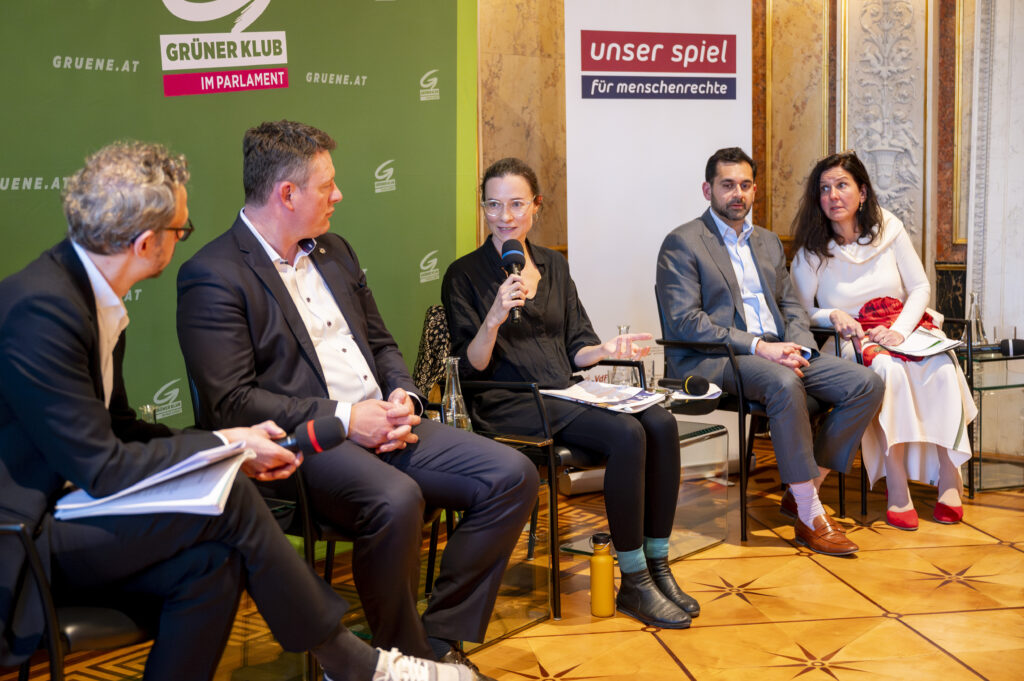
Hanna Stepanik, project officer at fairplay in the field of sport, development and human rights
Martin Poiger, Secretary General of the European Judo Union, gave a sobering insight into the allocation of major international sporting events: “International federations are all about finding organizers for major events. Major events generate TV income and, in the best case, license income for the federation. In return, the organizer can exploit advertising rights. And from this perspective, the main point is simply the money. I assume that Qatar paid a very high fee to FIFA.” International federations are primarily looking for organizers and it is logical that they go where the highest fee can be earned.
According to Poiger, many western democracies are not able to convince their populations in terms of the implementation and financing of major sporting events, and ultimately leaving them with questionable countries that want to invest so much in sport. However, FIFA should not be defended because it had more than enough alternatives. So what can be done? Poiger is in favor of having international federations in Western Europe or Austria and having reflected people on the board committees, as this would take the discussions in a different direction. Awareness of human rights already exists in many cases, but decision-makers need to become even more aware of their responsibility.
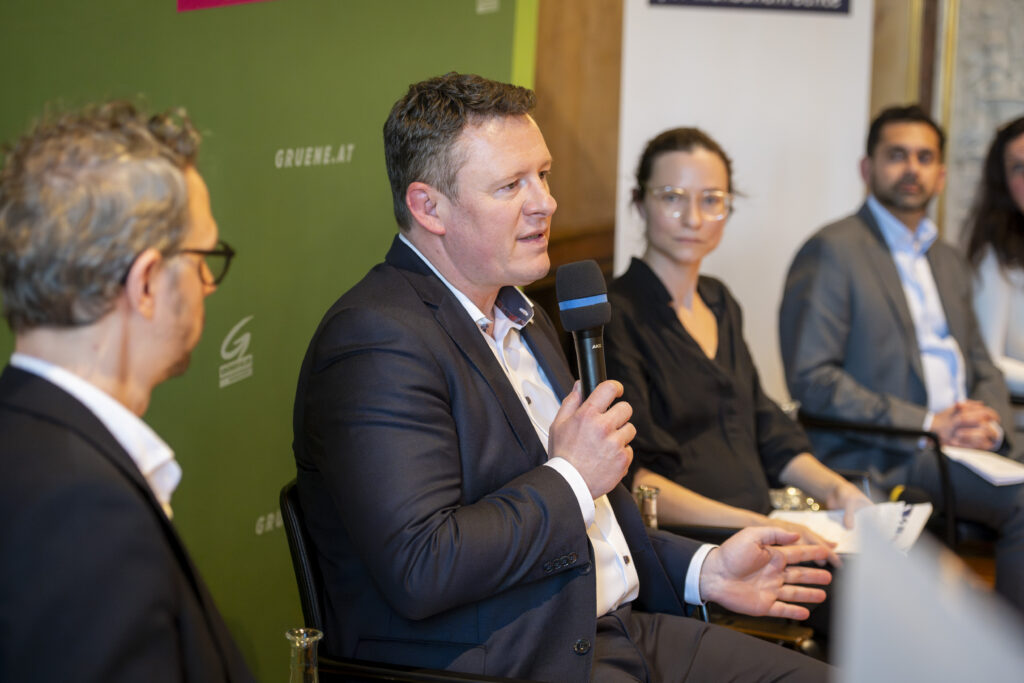
Martin Poiger, Secretary General of the European Judo Union
Regarding the role of different stakeholders, Mustafa Qadri noted three key points: Firstly, it is important to emphasize that there are human rights problems everywhere and that no country is superior to another. Secondly, it can be generalized that sport is run by monopolies. There are huge social and economic powers that become unaccountable institutions. We all go to sport to escape from everyday life and that is a good thing. Despite the problematic monopoly situation, sport is therefore fundamentally about equal opportunities and fairness. And thirdly, a country like Austria, for example, should also talk about workers in Qatar, but not forget the African and Asian workers in Vienna: “Because what is global is also local”. Sport can be used all over the world to raise awareness of human rights – especially among an audience that may otherwise have little interest in human rights. This work must take place through collaborations and across borders.
As an example of possible activities in Austria, Hanna Stepanik reported on the Sport and Human Rights Working Group. The working group now has more than 20 members, made up of sports associations and human rights organizations as well as the Ministry of Sport. The regular meetings result in a regular dialog between NGOs and sports associations, which in turn creates (inter)national networking opportunities and a lively exchange of experiences, such as recently on the topic of trans athletes or the IOC policy on Russia. The main aim is to raise awareness among the sports community and its various stakeholders and to take human rights into account before and during major sporting events. The handbook “International Sporting Events & Human Rights – A Handbook for Implementation in Austria”, which is perceived as a pioneer both nationally and internationally and is very well received, is mentioned as a concrete action of the working group. The UEFA EURO 2024, which will take place in Germany this year, is also strongly concerned with the topic of human rights and sustainability – UEFA and the DFB have even presented a human rights declaration: “We very much welcome this. The document contains a very comprehensive risk analysis, but it remains to be seen how much this will be reflected in reality. We from the fairplay initiative will be on site, we want to take a look at it and have a critical eye on it.”
Martin Poiger also gave an insight into the activities of the Sport and Human Rights Working Group. He reported that the handbook has raised awareness of the issue among many associations. This awareness is particularly important at the management level of national and international associations. It must be made clear that it is not just about money. In decision-making processes, for example, a kind of “red line” would have to be defined, stating that “if minimum standards are not met, then such applicants are simply eliminated”. However, these changes would have to happen step by step: With every event, with every Working Group meeting, with every exchange, you get one step further.
The role and responsibility of political decision-makers
The second panel consisted of Agnes Sirkka Prammer, Chairwoman of the Sports Committee of the National Council (The Greens), ÖVP Sports Spokesperson Christoph Zarits and SPÖ Sports Spokesperson Maximilian Köllner. NEOS sports spokesperson Yannick Shetty had to leave the event early for scheduling reasons and was unable to participate actively.
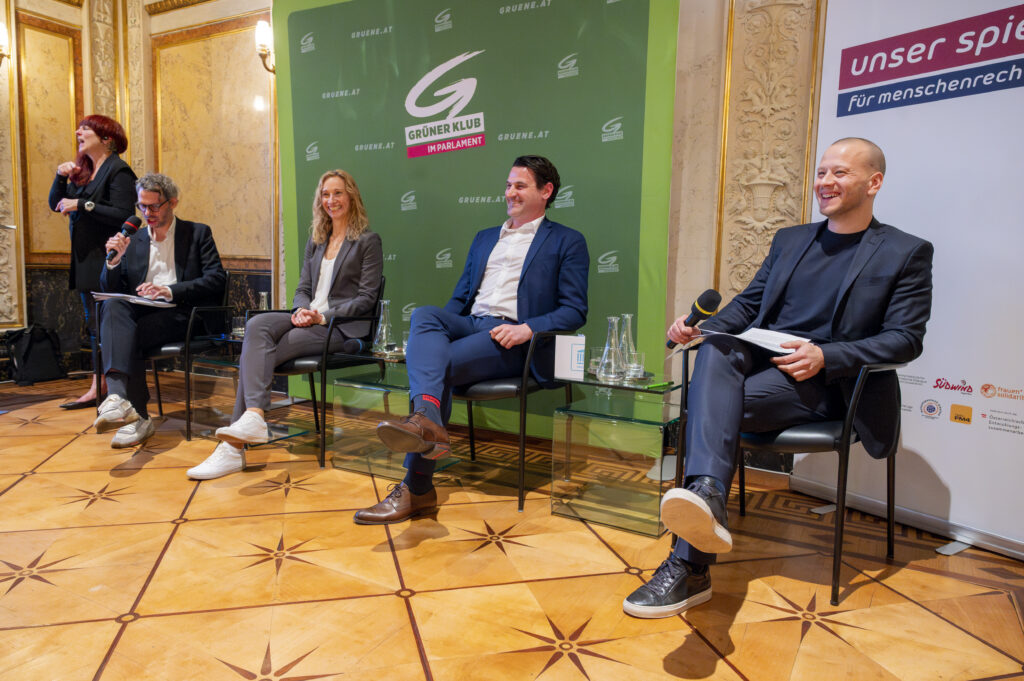
Second panel with Agnes Sirkka Prammer, Christoph Zarits and Maximilian Köllner
When asked whether the National Council had taken a clear enough stance on the human rights violations in Qatar, Maximilian Köllner replied: “We have to look at what options we have as sports spokespeople and parliamentarians. On the one hand, we can raise our voices and point out where we can intervene. On a political level, I have to be honest: We have the opportunity here in parliament to pass laws, for example on sports funding, to introduce control mechanisms. We also have the opportunity, and I also see this as a task, to work at other levels to ensure that incidents like the one in Qatar no longer occur. We must learn from this. Austria is part of the European Union, we have to campaign at a European level. Fundamentally, sport is a beautiful thing, because it unites”.
Agnes Sirkka Prammer explained the role of human rights in the Sports Committee: “Human rights do play a role in the Sports Committee. The motion to promote human rights through sport and major sporting events in 2021 was not only adopted unanimously, but was also tabled jointly by four parties. This is an issue on which we are actually all in agreement. The content of the motion was that the sports world – national and international organizations – should work to ensure that uniform standards are introduced to ensure that the staging and implementation of sporting events adhere to human rights standards.”
Prammer, who is responsible for women in the ÖFB Referees Commission, advocates rules off the pitch: “It is essential to have a set of rules within which sport can operate. International federations decide where major events are held, but the staging of major events always takes place within the framework offered by the respective venues. And that is why it is important, on the one hand, to influence the national federations so that they make the appropriate decisions with their respective international federations. And that such decisions on awarding contracts are also linked to criteria such as whether human rights are respected, but also, for example, whether sustainable business practices are used.”
“Of course it is crucial which countries pay how much and you can’t blame the sports associations for that. A good event costs money, but you can’t leave it to individuals; the legislator has to be involved.”
In response to the question of whether the issue of sport and human rights is sufficiently important in parliament, Christoph Zarits from the ÖVP said: “We passed a resolution in the National Council, which was signed by four parties and supported by all parties, calling on the Federal Minister, our Vice-Chancellor, to speak out at European level and this has been done. We will also continue to work on this issue together with our colleagues who are responsible for human rights in all parties and find a solution together. What I take away from the first panel is that we must not overburden sport, but that politics must find solutions together with sport.”
Maximilian Köllner, who actively plays football for the amateur club FC Illmitz, emphasized that there is also an opportunity to address the topic of human rights at a small, local level and draw attention to it: “Integration and inclusion starts with every small club, on the small sports field. We need to use our media power to raise awareness and increase awareness. We also need to train and sensitize coaches as early as possible, because there is also great power in raising awareness. And then I look forward to a positive future in sport, because sport is perhaps the most unifying element of all.”
Returning to Austria’s role, Christoph Zarits once again pointed out that “as Austria, we set many priorities and are pioneers when it comes to human rights. It is often western countries that have no interest in hosting major sporting events. It is therefore important that we create the right political framework conditions. We are still at the beginning, but we are taking the right steps, step-by-step.”
This was also emphasized by Agnes Sirkka Prammer in conclusion: “It is precisely about creating framework conditions that enable us to hold major events here as well.
What we are already doing – there is the aforementioned working group, which is a very important asset. This working group has produced the handbook, which is also in demand internationally. Austria is really leading the way and setting international benchmarks, which is something we can be very proud of.
A further step could be to try to set standards for international events and to raise the level of dialogue and exchange within the working group. We must raise our voices internationally and stand up for human rights, and advocate that sport and human rights must be seen together. Even if you want to hide from reality during a sporting event, it still exists. We must always keep this in mind and always address abuses”.
According to Prammer, hosting an event like the one in Qatar therefore also has a positive aspect, as it brings up issues that would otherwise have received little international attention. What is important here, however, is to take a long-term view and try to create conditions that also oblige countries to keep their promises in retrospect. And this must happen at a political level, because once a major event has been held, sport and its various actors are gone.
The event was organized by the Green Club in Parliament and the fairplay initiative at the Vienna Institute for International Dialogue and Cooperation (VIDC) as part of the Our Game for Human Rights project. We would like to thank the Austrian Development Agency (ADA) and the Ministry of Sport (BMKÖS), which was represented by Dieter Brosz, Head of the Department of Sport and Society, for their support.
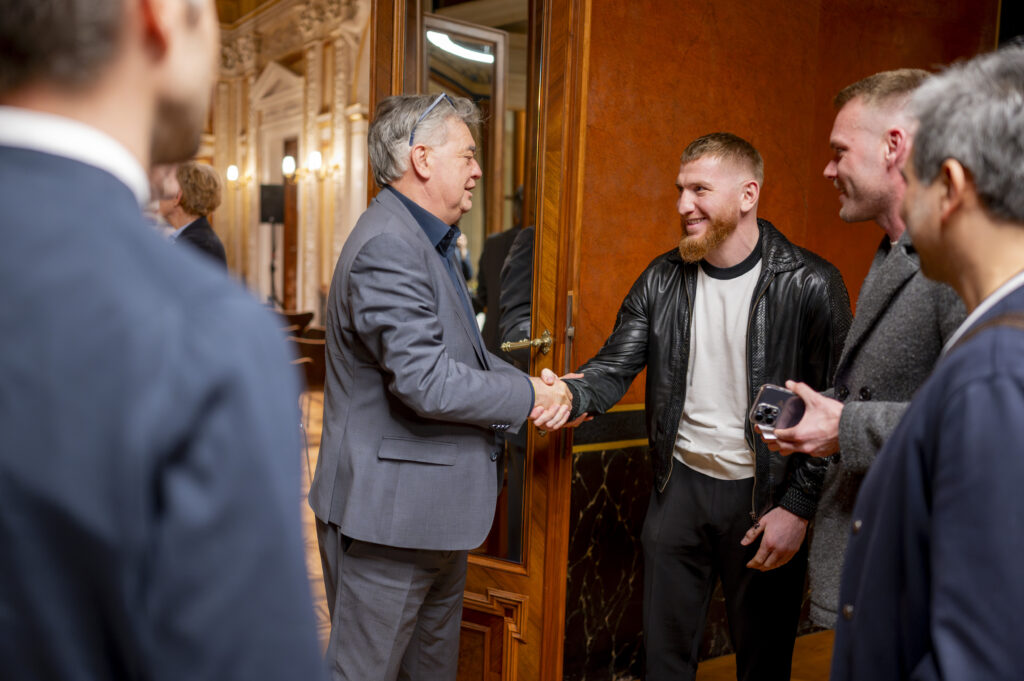
Vice-Chancellor Werner Kogler with professional boxer Mansur Elsaev
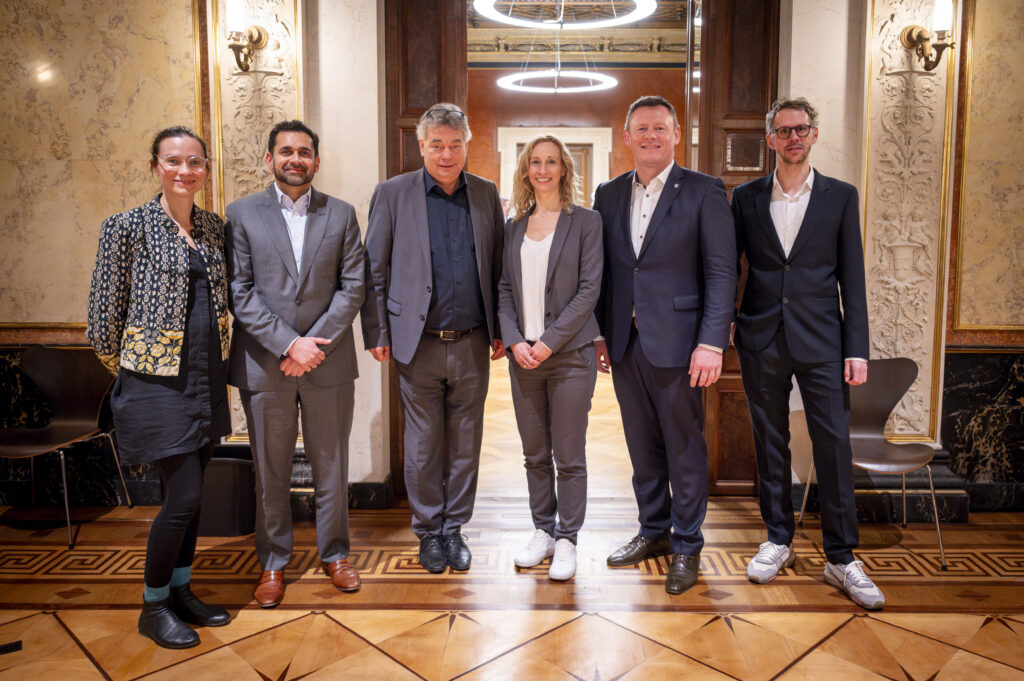
Vice-Chancellor Kogler with Stepanik, Qadri, Prammer, Poiger and Kainz (from left to right)
Photos: Karo Pernegger
